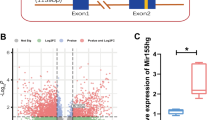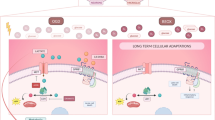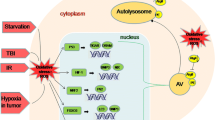Abstract
Ischemia/reperfusion is a key feature of acute ischemic stroke, which causes neuron dysfunction and death. Exosomes, small extracellular vesicles produced by most cell types, are implicated in the mediation of cellular interactions with their environment. Here, we investigated the contents and functions of exosomes from neurons under ischemic reperfusion injury. First, rat cortical primary neuronal cell cultures were placed in an oxygen- and glucose-deprived (OGD) medium, followed by reperfusion in a normoxic conditioned medium (OGD/R) to mimic ischemia/reperfusion in vitro. The neuron-derived exosomes were harvested from the conditioned medium under normoxia and OGD/R. Through next-generation sequencing, exosomal miRNA expression levels in normoxic and OGD/R condition were compared. Their functional activity in terms of neuron viability and quantitative analysis of neurite outgrowth were examined. The expression levels of 45 exosomal miRNAs were significantly different between normoxic and OGD/R conditions. Bioinformatics analysis of dysregulated exosomal miRNAs identified multiple pathways involved in cell survival and death processes and neuronal signaling. Moreover, treatment with exosomes from OGD/R to cultured cortical neurons significantly impaired neuronal cell viability and reduced neurite outgrowth in terms of the number of primary or total neurites as well as length of primary neurites, compared with exosomes from normoxic conditions. miRNA-packed exosomes released by neurons under OGD/R challenge may contribute to post ischemic neuronal injury and provide further understanding of the effect of stressed neurons on neighboring neuronal functions.





Similar content being viewed by others
References
Absalon, S., Kochanek, D. M., Raghavan, V., & Krichevsky, A. M. (2013). MiR-26b, upregulated in Alzheimer’s disease, activates cell cycle entry, tau-phosphorylation, and apoptosis in postmitotic neurons. Journal of Neuroscience, 33(37), 14645–14659. https://doi.org/10.1523/JNEUROSCI.1327-13.2013.
Allen, N. J., & Barres, B. A. (2009). Neuroscience: Glia - more than just brain glue. Nature, 457(7230), 675–677. https://doi.org/10.1038/457675a.
Ambros, V. (2004). The functions of animal microRNAs. Nature, 431(7006), 350–355. https://doi.org/10.1038/nature02871.
Auber, M., Fröhlich, D., Drechsel, O., Karaulanov, E., & Krämer-Albers, E. M. (2019). Serum-free media supplements carry miRNAs that co-purify with extracellular vesicles. J Extracell Vesicles. https://doi.org/10.1080/20013078.2019.1656042.
Buller, B., Liu, X., Wang, X., Zhang, R. L., Zhang, L., Hozeska-Solgot, A., et al. (2010). MicroRNA-21 protects neurons from ischemic death. FEBS Journal, 277(20), 4299–4307. https://doi.org/10.1111/j.1742-4658.2010.07818.x.
Chandran, R., Mehta, S. L., & Vemuganti, R. (2017). Non-coding RNAs and neuroprotection after acute CNS injuries. Neurochemistry International, 111, 12–22. https://doi.org/10.1016/j.neuint.2017.01.015.
Chaudhuri, A. D., Dastgheyb, R. M., Yoo, S. W., Trout, A., Talbot, C. C., Jr., Hao, H., et al. (2018). TNFalpha and IL-1beta modify the miRNA cargo of astrocyte shed extracellular vesicles to regulate neurotrophic signaling in neurons. Cell Death Dis, 9(3), 363. https://doi.org/10.1038/s41419-018-0369-4.
Chivet, M., Javalet, C., Laulagnier, K., Blot, B., Hemming, F. J., & Sadoul, R. (2014). Exosomes secreted by cortical neurons upon glutamatergic synapse activation specifically interact with neurons. J Extracell Vesicles, 3, 24722. https://doi.org/10.3402/jev.v3.24722.
Faure, J., Lachenal, G., Court, M., Hirrlinger, J., Chatellard-Causse, C., Blot, B., et al. (2006). Exosomes are released by cultured cortical neurones. Molecular and Cellular Neuroscience, 31(4), 642–648. https://doi.org/10.1016/j.mcn.2005.12.003.
Harrison, E. B., Hochfelder, C. G., Lamberty, B. G., Meays, B. M., Morsey, B. M., Kelso, M. L., et al. (2016). Traumatic brain injury increases levels of miR-21 in extracellular vesicles: implications for neuroinflammation. FEBS Open Bio, 6(8), 835–846. https://doi.org/10.1002/2211-5463.12092.
Khoshnam, S. E., Winlow, W., Farbood, Y., Moghaddam, H. F., & Farzaneh, M. (2017). Emerging Roles of microRNAs in Ischemic Stroke: As Possible Therapeutic Agents. J Stroke, 19(2), 166–187. https://doi.org/10.5853/jos.2016.01368.
Kowal, J., Tkach, M., & Thery, C. (2014). Biogenesis and secretion of exosomes. Current Opinion in Cell Biology, 29, 116–125. https://doi.org/10.1016/j.ceb.2014.05.004.
Kramer-Albers, E. M., Bretz, N., Tenzer, S., Winterstein, C., Mobius, W., Berger, H., et al. (2007). Oligodendrocytes secrete exosomes containing major myelin and stress-protective proteins: Trophic support for axons? Proteomics Clin Appl, 1(11), 1446–1461. https://doi.org/10.1002/prca.200700522.
Montecalvo, A., Larregina, A. T., Shufesky, W. J., Stolz, D. B., Sullivan, M. L., Karlsson, J. M., et al. (2012). Mechanism of transfer of functional microRNAs between mouse dendritic cells via exosomes. Blood, 119(3), 756–766. https://doi.org/10.1182/blood-2011-02-338004.
Morel, L., Regan, M., Higashimori, H., Ng, S. K., Esau, C., Vidensky, S., et al. (2013). Neuronal exosomal miRNA-dependent translational regulation of astroglial glutamate transporter GLT1. Journal of Biological Chemistry, 288(10), 7105–7116. https://doi.org/10.1074/jbc.M112.410944.
Moskowitz, M. A., Lo, E. H., & Iadecola, C. (2010). The science of stroke: mechanisms in search of treatments. Neuron, 67(2), 181–198. https://doi.org/10.1016/j.neuron.2010.07.002.
Pan, B. T., Teng, K., Wu, C., Adam, M., & Johnstone, R. M. (1985). Electron microscopic evidence for externalization of the transferrin receptor in vesicular form in sheep reticulocytes. Journal of Cell Biology, 101, 942–948.
Packer, A. N., Xing, Y., Harper, S. Q., Jones, L., & Davidson, B. L. (2008). The bifunctional microRNA miR-9/miR-9* regulates REST and CoREST and is downregulated in Huntington’s disease. Journal of Neuroscience, 28(53), 14341–14346. https://doi.org/10.1523/JNEUROSCI.2390-08.2008.
Potolicchio, I., Carven, G. J., Xu, X., Stipp, C., Riese, R. J., Stern, L. J., et al. (2005). Proteomic analysis of microglia-derived exosomes: metabolic role of the aminopeptidase CD13 in neuropeptide catabolism. The Journal of Immunology, 175(4), 2237–2243. https://doi.org/10.4049/jimmunol.175.4.2237.
Sharma, P., Mesci, P., Carromeu, C., McClatchy, D. R., Schiapparelli, L., Yates, J. R., 3rd., et al. (2019). Exosomes regulate neurogenesis and circuit assembly. Proc Natl Acad Sci U S A, 116(32), 16086–16094. https://doi.org/10.1073/pnas.1902513116.
Sim, S. E., Lim, C. S., Kim, J. I., Seo, D., Chun, H., Yu, N. K., et al. (2016). The Brain-Enriched MicroRNA miR-9-3p Regulates Synaptic Plasticity and Memory. Journal of Neuroscience, 36(33), 8641–8652. https://doi.org/10.1523/JNEUROSCI.0630-16.2016.
Sticht, C., De La Torre, C., Parveen, A., & Gretz, N. (2018). miRWalk: An online resource for prediction of microRNA binding sites. PLoS ONE, 13(10), e0206239. https://doi.org/10.1371/journal.pone.0206239.
Tao, Z., Zhao, H., Wang, R., Liu, P., Yan, F., Zhang, C., et al. (2015). Neuroprotective effect of microRNA-99a against focal cerebral ischemia-reperfusion injury in mice. Journal of the Neurological Sciences, 355(1–2), 113–119. https://doi.org/10.1016/j.jns.2015.05.036.
Takahashi, A., Okada, R., Nagao, K., Kawamata, Y., Hanyu, A., Yoshimoto, S., et al. (2017). Exosomes maintain cellular homeostasis by excreting harmful DNA from cells. Nat Commun., 16(8), 15287. https://doi.org/10.1038/ncomms15287.
Tarazona, S., Furio-Tari, P., Turra, D., Pietro, A. D., Nueda, M. J., Ferrer, A., et al. (2015). Data quality aware analysis of differential expression in RNA-seq with NOISeq R/Bioc package. Nucleic Acids Research, 43(21), e140. https://doi.org/10.1093/nar/gkv711.
Taylor, A. R., Robinson, M. B., Gifondorwa, D. J., Tytell, M., & Milligan, C. E. (2007). Regulation of heat shock protein 70 release in astrocytes: role of signaling kinases. Dev Neurobiol, 67(13), 1815–1829. https://doi.org/10.1002/dneu.20559.
Thakur, B. K., Zhang, H., Becker, A., Matei, I., Huang, Y., Costa-Silva, B., et al. (2014). Double-stranded DNA in exosomes: a novel biomarker in cancer detection. Cell Research, 24(6), 766–769. https://doi.org/10.1038/cr.2014.44.
Valadi, H., Ekstrom, K., Bossios, A., Sjostrand, M., Lee, J. J., & Lotvall, J. O. (2007). Exosome-mediated transfer of mRNAs and microRNAs is a novel mechanism of genetic exchange between cells. Nature Cell Biology, 9(6), 654–659. https://doi.org/10.1038/ncb1596.
Wang, W., Li, D. B., Li, R. Y., Zhou, X., Yu, D. J., Lan, X. Y., et al. (2018). Diagnosis of Hyperacute and Acute Ischaemic Stroke: The Potential Utility of Exosomal MicroRNA-21-5p and MicroRNA-30a-5p. Cerebrovasc Dis, 45(5–6), 204–212. https://doi.org/10.1159/000488365.
Yu, G., Wang, L. G., Han, Y., & He, Q. Y. (2012). clusterProfiler: an R package for comparing biological themes among gene clusters. OMICS: A Journal of Integrative Biology, 16(5), 284–287. https://doi.org/10.1089/omi.2011.0118.
Acknowledgements
This work was supported by a research grant from National Taiwan University Hospital (NTUH), Taipei, Taiwan [Grant number 107-003774] and the Ministry of Science and Technology in Taiwan [Grant number 103-2314-B-002-001]. We are grateful for the technical support provided by the Microscopy Core Facility and the 2nd, 3rd and 6th Core Facility, Department of Medical Research, National Taiwan University Hospital.
Author information
Authors and Affiliations
Corresponding author
Ethics declarations
Conflict of interest
The authors declare that they have no conflicts of interest.
Research Involving Human and Animal Participants
All animal experiments were conducted with the approval of the Institutional Animal Care and Utilization Committee by National Taiwan University.
Additional information
Publisher's Note
Springer Nature remains neutral with regard to jurisdictional claims in published maps and institutional affiliations.
Supplementary Information
Below is the link to the electronic supplementary material.
Rights and permissions
About this article
Cite this article
Chiang, CS., Fu, SJ., Hsu, CL. et al. Neuronal Exosomes Secreted under Oxygen–Glucose Deprivation/Reperfusion Presenting Differentially Expressed miRNAs and Affecting Neuronal Survival and Neurite Outgrowth. Neuromol Med 23, 404–415 (2021). https://doi.org/10.1007/s12017-020-08641-z
Received:
Accepted:
Published:
Issue Date:
DOI: https://doi.org/10.1007/s12017-020-08641-z




